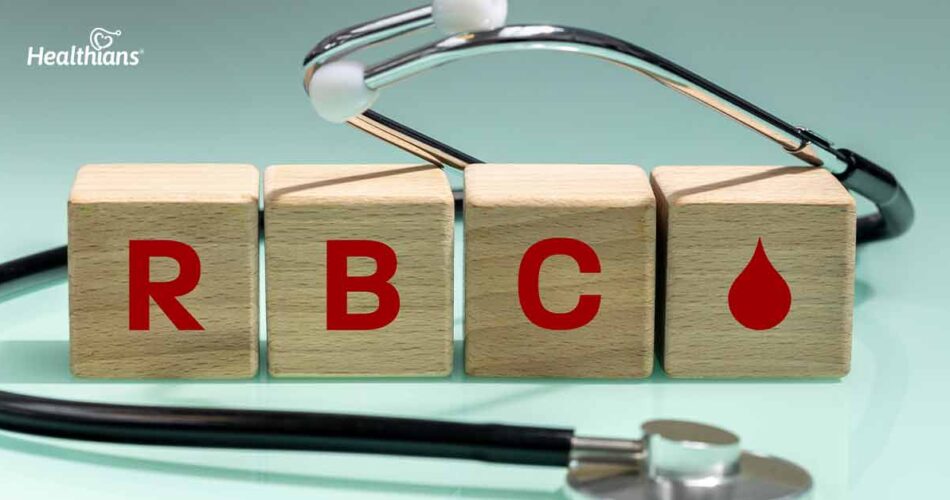Contributed by: Healthians Team
Introduction
Red blood cells (RBCs) are a major component of your blood. They aid in the transportation of oxygen from your lungs to the rest of your body, But, when your red blood cell count is high (you have more red blood cells than usual), it could mean you have an underlying health condition.
What does it mean if you have a high red blood cell count?
Having a high red blood cell count makes your blood thicker than it should be, and it increases your risk for blood clots.
Do you develop any symptoms if you have a high red blood cell count?
High red blood cell count symptoms may include:
- Fatigue
- Shortness of breath
- Frequent headaches
- Dizziness
- Weakness
- Blurry vision
- Sleep disorders
- Joint pains
- Itchy skin
- Numbness and/or tingling
- Nosebleeds
However, people with a high red blood cell count don’t develop any symptoms.
What are the causes a high red blood cell count?
A high red blood cell count may be the first symptom of an underlying disease or disorder.
However, it doesn’t always mean that you have a health problem. Some medical or lifestyle factors may also cause a high red blood cell count.
Medical conditions that can cause elevated red blood cells, include:
- Dehydration
- Heart disease
- Polycythemia vera
- Kidney tumours
- Lung disease
- Hypoxia
- Carbon monoxide exposure
- Sleep apnea
Various lifestyle factors that may cause a high red blood cell count include:
- Smoking
- Living at a high altitude
- Taking performance-enhancing drugs
Can stress be related to a higher red blood cell count?
Research has shown a definitive link between stress and its effect on the blood cells. Stress can directly lead to an increase in red blood cells, neutrophils (a type of white blood cell) and platelets.
Should you worry if your red blood cell count is high?
While a high red blood cell count may indicate a disease or disorder, it doesn’t always mean you have a health condition.
But, if you have a high red blood cell count, it’s recommended to have additional testing done to find the cause and determine if treatment is necessary.
Can you prevent elevated red blood cells?
You cannot always prevent a high red blood cell count. However, there are things you can do to lower your risk, including:
- Drinking lots of water
- Avoiding coffee, soda and other diuretics
- Quitting smoking
- Exercising
- Avoiding iron supplements, anabolic steroids or other performance-enhancing drugs
- Use appropriate medical devices, such as a CPAP, if you have sleep apnea.
When should you see the healthcare provider?
Most of the time, people only discover that they have an increased red blood count when they undergo blood tests for something else.
It is recommended that you talk to your healthcare provider about the results of your blood test.
An elevated count of red blood cells could mean that you have another, underlying health condition.
How can you tell if your red blood cell count is high?
An RBC count that is higher than normal is often the first sign of an illness. Your healthcare provider may run a few tests to measure the different parts and features of your blood. The tests may allow you to get the necessary treatment even before you have symptoms.
These tests may include:
- Red blood cell count (RBC)
- Haemoglobin test
- Hematocrit test
- Complete blood count (CBC)
Other diagnostic tests may be requested if your healthcare professional suspects you have a specific illness, which could include:
- A reticulocyte count test to count the reticulocytes in the blood.
- A vitamin B test to determine the blood’s concentration of one or more B vitamins.
- An iron test to measure iron levels in the blood.
Also, make a habit of taking preventive health checkups as they can help you in getting a complete insight into your health.
This will also help you with taking measures to promote your overall well-being.




